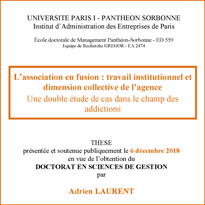L'association en fusion : travail institutionnel et dimension collective de l'agence. Une double étude de cas dans le champ des addictions
- IAE de Paris (salle D6)
12 rue Jean-Antoine de Baïf
75013 Paris
Soutenance de thèse d'Adrien LAURENT, ancien élève du département Droit - économie - management, promotion 2010 (Université Paris 1 - Panthéon-Sorbonne | IAE de Paris)
Mention Sciences de gestion

/medias/photo/pages-de-these-resume_1542797685892-png
Résumé
Soumises à une profonde reconfiguration du champ d’intervention de la puissance publique, les associations des champs sanitaire, social et médico-social ont connu au cours de la décennie écoulée un mouvement de regroupement et de fusion important. Les constats qui émergent de la littérature soulignent alors la normalisation gestionnaire dont ce mouvement serait le symptôme, ainsi que l’alignement sur une « norme du bon opérateur associatif ».
Ce travail de thèse vient nuancer ce constat univoque en s’intéressant à la fonction sociopolitique de l’association dans les contextes de fusion. Plus précisément, l’analyse est conduite en recourant à la perspective du travail institutionnel et à des compléments analytiques issus de la sociologie de la traduction afin d’étudier l’émergence d’une agence collective.
L’empirie menée dans le cadre de cette recherche porte sur le champ des addictions, constitué au cours des années 2000 suite à une profonde réforme règlementaire. Notre travail présente les processus par lesquels se constitue et se déploie la capacité d’agence des associations impliquées dans des opérations de fusion, en associant étroitement dimension institutionnelle, acteurs et dispositifs de gestion.
Mots-clefs : Fusion, néo-institutionnalisme, travail institutionnel, sociologie de la traduction, association, secteur médico-social, addictologie
Abstact
Association mergers: institutional work and the collective dimension of agency
Two case-studies in the field of addictions
The recent years have been characterized by a deep reconfiguration of State intervention in health and social activities, especially in terms of public funding arrangements. As a consequence, mergers among associations involved in those fields have become more common. Previous studies have underlined the link between such a trend and a broader process leading nonprofit organizations to become business-like and to adopt managerialism.
The present thesis contributes to moderate this finding by focusing on the sociopolitical function of associations in merger context. The analysis is conducted using the perspectives of institutional work and actor-network theory in order to study the emergence of collective agency.
The empirical work carried out as part of this research focuses on the field of addictions, created in the 2000s following a major regulatory reform. Our work presents the processes by which the agency of the associations is constituted and exerted. More specifically, we underline the need to closely associate actors, instruments and institutions in the study of collective agency.
Key-words: Merger, new institutionalism, institutional work, actor-network theory, nonprofit organizations, addictions
- Thématique(s)
- Recherche - Valorisation
- Contact
- Adrien Laurent (adrien.laurent@live.fr)
Mise à jour le 21 novembre 2018







